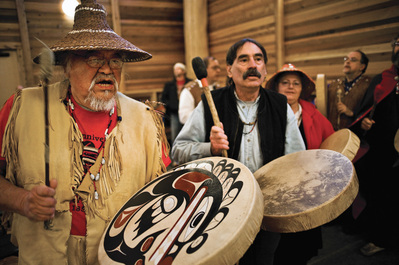
- Details
- By Kelsey Turner
The Duwamish Tribe has lived in the Seattle area since time immemorial. Though the tribe signed the Treaty of Point Elliott in 1855 creating a government-to-government relationship with the U.S., it is still not federally recognized. This week, the Duwamish Tribe plans to file a lawsuit against the U.S. federal government to defend its tribal sovereignty.
“From 1859, when the Treaty of Point Elliott was ratified, until at least 2001, Congress and other federal authorities have unambiguously recognized the Duwamish Tribe,” the Tribe wrote in a media advisory Tuesday. “Yet, today, the U.S. Department of Interior refuses to officially recognize the Duwamish Tribe in violation of the U.S. Constitution and other federal laws.”
The lawsuit will be filed in the U.S. District Court for the Western District of Washington. After filing the complaint, the legal team representing the tribe will summarize the arguments in support of federal recognition at an event at the Duwamish Longhouse and Cultural Center in Seattle at 11:30 a.m. Wednesday. Speakers at the event include Duwamish Tribal Chairwoman Cecile Hansen, Duwamish Tribal Council members and the tribe’s attorneys, among others. Participants can also join the event virtually on Zoom by registering here.
“In the absence of federal recognition, funding, and human services, Duwamish Tribal Services has struggled to provide numerous social, educational, health, and cultural programs,” the tribe says on their website. The tribe, which has over 600 enrolled members, adds that “many more” Duwamish people have chosen not to enroll, instead enrolling in federally recognized tribes that provide health and other human services.
Over 100,000 people have signed the Duwamish Tribe’s petition for federal recognition. “Momentum has been building publicly and politically in support of restoring federal recognition,” the media advisory stated.
More Stories Like This
Committee Advances 20% Increase to Navajo Child Support GuidelinesNavajo Committee Advances $84M Transportation Improvement Plan
NCAI Passes Two Emergency Resolutions on Immigration Enforcement Activities
Chickasaw Lighthorse Police Officer named Indian Country Law Enforcement Officer of the Year
Indian Gaming Association Rallies Broad Coalition Against Sports Event Contracts It Calls Illegal Threat to Tribal Sovereignty
Help us defend tribal sovereignty.
At Native News Online, our mission is rooted in telling the stories that strengthen sovereignty and uplift Indigenous voices — not just at year’s end, but every single day.
Because of your generosity last year, we were able to keep our reporters on the ground in tribal communities, at national gatherings and in the halls of Congress — covering the issues that matter most to Indian Country: sovereignty, culture, education, health and economic opportunity.
That support sustained us through a tough year in 2025. Now, as we look to the year ahead, we need your help right now to ensure warrior journalism remains strong — reporting that defends tribal sovereignty, amplifies Native truth, and holds power accountable.
 The stakes couldn't be higher. Your support keeps Native voices heard, Native stories told and Native sovereignty defended.
The stakes couldn't be higher. Your support keeps Native voices heard, Native stories told and Native sovereignty defended.
Stand with Warrior Journalism today.
Levi Rickert (Potawatomi), Editor & Publisher

